15.07.2024
Description
Politiche sociali represents a critical reference point for Italian as well as international scholars interested in Southern European Welfare States, while at the same time offering the Italian readership an opportunity to be informed and reflect on topical developments and theoretical debates at the European level. Depending on the subject, articles will be published in Italian or English in order to achieve this two-fold objective. The journal is peer-reviewed, multidisciplinary in scope, and it hopes to foster a fruitful dialogue between scholars, on the one hand, and policy makers, on the other. Contributions combine a sound theoretical framework together with rigorous empirical analysis on a wide range of social policy issues which includes: poverty and social exclusion, education, training and labour market policies; family policies, health and social care services; aging and pensions, gender and migration. Of specific interest are cross-national studies which focus on the public/private mix in social provision, Europeanisation processes and also the interaction between national, sub-national and supra-national levels of government in Southern Europe. Journal issues feature two briefing sections. One specifically for Italian issues, devoted to the latest and most important social policy developments in the country. The other on European matters, focused on topical EU level decisions that are relevant for social protection systems and the social dimension of the European integration process. Articles should be submitted in either Italian or English and will be selected for publication as a result of a strict double-blind peer-review process.
Politiche sociali è su Twitter
Highlights
OPEN ACCESS
OPEN ACCESS
OPEN ACCESS
The journals on this platform adopt and promote specific guidelines (PEMS) about publishing ethics. Our ethics statements are based on COPE’s Best Practice Guidelines for Journal Editors.
Keep reading